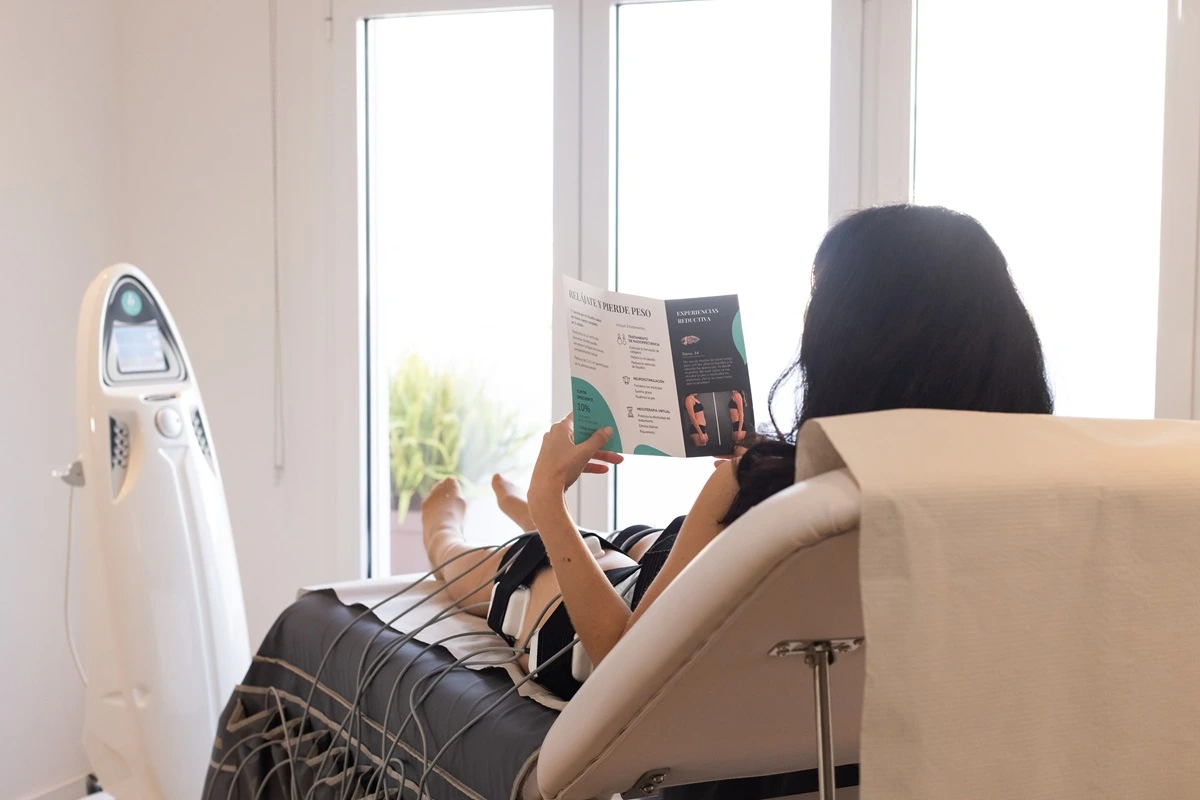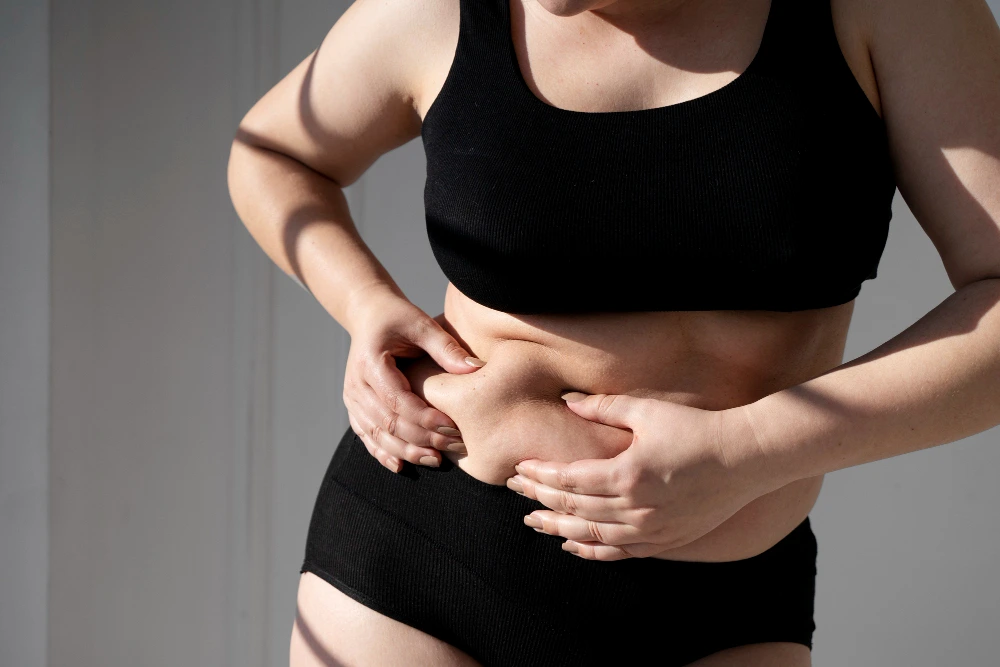How to unlock sustainable menopause weight loss for a healthier you
Menopause is a time of transformation, bringing both physical and emotional changes. For many women, one of the most unexpected challenges is menopause weight gain. Hormonal shifts, slower metabolism, and changes in muscle mass can make it feel harder than ever to maintain a healthy weight. But while the struggle is real, it’s not insurmountable.
Understanding the causes and duration of menopause weight gain, and how to address them is the first step towards feeling confident and in control during this life stage. Let’s explore practical ways to manage menopause weight loss and prioritize your well-being through menopause and beyond.

What Is menopause and how does weight gain occur?
Menopause is a natural phase of life that marks the end of a woman’s reproductive years. It’s officially diagnosed after 12 consecutive months without a menstrual period, typically occurring between the ages of 45 and 55. While it’s a normal biological process, the hormonal shifts associated with menopause can bring noticeable changes, including weight gain.
Many women begin to see changes in weight during perimenopause (the years leading up to menopause), and this trend can continue into their 50s. A European survey found that 50% of post-menopausal women reported gaining at least 4.5 kg during menopause. But why does this happen? It’s not just about hormones; weight gain during menopause is influenced by a variety of factors:

Age-related changes
With age, muscle mass naturally decreases while fat increases. Since muscles burn more calories than fat, this shift can slow overall calorie burning.
Slower metabolism
A decrease in muscle mass leads to a slower metabolic rate, meaning your body requires fewer calories to maintain weight. Eating the same amount without increasing activity can result in gradual weight gain.
Hormonal shifts
Changes in estrogen levels can make your body more likely to store fat, especially around the abdomen, rather than the hips and thighs.
Lifestyle habits
Reduced physical activity, an unhealthy diet, and insufficient sleep can contribute to weight gain during menopause.
Genetics
Your genetic makeup can determine where and how your body stores fat, making some individuals more prone to gaining weight in specific areas.
Stress
Chronic stress elevates cortisol levels, which is linked to higher abdominal fat and cravings for comfort foods.
Sleep disruptions
Difficulty in sleeping, common during menopause, can raise levels of the hunger hormone ghrelin and suppress the fullness hormone leptin, leading to increased appetite and potential overeating.
While these factors can make weight management more challenging, it’s important to remember that weight gain during menopause is not inevitable. By adopting supportive lifestyle changes—including regular exercise, a balanced diet, stress management, and healthy sleep practices—you can counteract many of these changes.
What causes menopause weight gain?
Menopause weight gain is driven by more than just hormonal changes. When exploring what causes weight gain during menopause, it’s essential to consider how the body’s reaction to stress, activity levels, and other health-related factors evolve during this time.
During menopause, the interplay of estrogen with other hormones like insulin can shift drastically. Lower estrogen levels not only impact fat distribution but can also make your body less sensitive to insulin, which regulates blood sugar. This may result in increased fat storage and stronger cravings for sugary or high-carbohydrate foods.
Additionally, menopause often coincides with shifts in energy levels and physical habits. Feeling fatigued or dealing with joint discomfort may lead to decreased movement. This natural decrease in activity can lead to fewer calories burned and, over time, contribute to Menopause weight gain.

Why is belly fat especially risky?
Belly fat during menopause carries more than aesthetic concerns; it’s a serious health issue. This type of fat, known as visceral fat, surrounds vital organs and increases the risk of chronic conditions like heart disease, type 2 diabetes, and certain cancers. It also contributes to inflammation in the body, which may worsen other age-related health issues. Addressing belly fat isn’t just about fitting into your clothes better; it’s also a step towards protecting your long-term well-being.
How does REDUCTIVA help with menopause weight loss?
Menopause can make weight loss feel like an uphill battle, but REDUCTIVA offers a targeted, non-invasive solution tailored to this stage of life. Unlike hormone therapy, which addresses symptoms like night sweats, hot flashes or sleep disturbances, REDUCTIVA directly focuses on improving body shape, burning fat, and supporting muscle health. This makes it a powerful tool for women aiming to tackle menopause weight loss and regain confidence.
One of the unique advantages of REDUCTIVA is its ability to address several factors contributing to menopause-related weight gain. It helps to reduce abdominal fat, tightens skin, and can even stimulate collagen formation for a smoother, more toned appearance. Its muscle-toning capabilities also counteract the age-related muscle loss that slows metabolism, enabling your body to burn calories more efficiently.
While hormone therapy can help balance estrogen levels and improve some menopause symptoms, it’s not designed specifically for weight management. Some hormone treatments may even lead to additional weight gain as a side effect. REDUCTIVA, on the other hand, provides a direct path to reshaping your body and easing the challenges of weight control without invasive procedures or extensive recovery time.




What to expect from your REDUCTIVA treatment
Undergoing a non-surgical treatment for weight loss after menopause can be a game-changer for managing menopause-related weight challenges. Each session is designed to promote fat reduction, support muscle maintenance, and improve overall body shape in a comfortable and non-invasive way. Here’s what to expect:

How sustainable are the effects of menopause weight loss with REDUCTIVA?
Sustaining weight loss, particularly during menopause, depends on taking a long-term, balanced approach. While treatments like REDUCTIVA can jump-start the process by reducing body volume and excess fat, maintaining these results requires ongoing dedication to healthy habits.
Consistent attention to nutrition and activity levels is key. Incorporating nutrient-rich foods, staying physically active, and managing stress all play vital roles in keeping the weight off. Additionally, getting enough rest and staying hydrated supports overall well-being, reinforcing the benefits of the treatment. By pairing treatments with a mindful, healthy lifestyle, you can enjoy longer-lasting results and feel great both inside and out.
Additionally, menopause often coincides with shifts in energy levels and physical habits. Feeling fatigued or dealing with joint discomfort may lead to decreased movement. This natural decrease in activity can lead to fewer calories burned and, over time, contribute to Menopause weight gain.

Transform your confidence during menopause with REDUCTIVA
- Non-invasive treatment with no downtime to help you lose weight
- Quick volume reduction (2–5 cm possible)
- Targets and reduces stubborn abdominal fat during menopause transition
- Supports weight loss after menopause and a flatter stomach
- Offers a tailored treatment plan designed to meet your unique needs
Are you ready to take the first step towards feeling better during menopause? Book your first session today and experience the difference REDUCTIVA can make. Enjoy immediate results and unlock your confidence for a healthier you!
FAQ's
Does weight loss get easier after menopause?
Weight loss after menopause can be more challenging due to slower metabolism and hormonal changes, but it’s not impossible. Lifestyle changes like a balanced diet and staying physically active can make a difference. Managing weight after menopause requires consistency and a focus on overall wellness.
Does menopause cause weight gain?
Menopause doesn’t directly cause weight gain, but hormonal changes can lead to fat distribution shifts and slower metabolism. Combined with lifestyle factors like reduced activity and age-related muscle loss, these changes can make weight gain during menopause more likely. Adopting healthy habits can help manage and prevent it.
Does weight gain during menopause go away?
Weight gain during menopause won’t automatically go away but managing it is possible by adopting healthy habits. A nutritious diet and regular physical activity may help reduce excess weight and improve overall health. Prioritizing quality of life through mindful changes can support long-term weight management.
What causes rapid weight gain in females?
Rapid weight gain in females can result from hormonal shifts, stress, or certain medical conditions. For menopausal women, decreased muscle mass and metabolic slowing also contribute to weight gain. A shift in dietary habits and reduced energy expenditure can further cause weight fluctuations.
Does menopause belly ever go away?
Yes, addressing menopause belly is achievable with focused efforts. A combination of aerobic exercise, strength training, and eating a Mediterranean diet can help reduce abdominal fat. Sustainable lifestyle changes that improve metabolism and cardiovascular health also help to manage weight long term.
Which dietary strategies are most effective during menopause?
During menopause, a diet can help with weight loss by focusing on lean meats, whole grains, vegetables, and healthy fats. Increasing fiber intake and limiting carbohydrates and added sugars improves blood sugar levels and supports bone health. These dietary adjustments also help reduce menopausal symptoms.
How does physical activity influence weight loss during this stage of life?
Regular physical activity plays a crucial role in weight loss for postmenopausal women. Strength training preserves muscle mass, while aerobic exercises burn calories and boost cardiovascular health. Staying active not only aids weight management but also reduces health risks and enhances overall well-being.